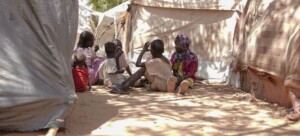Covid-19 stresses Sudan’s health services
The rapidly growing number of coronavirus cases in Sudan are burdening the already worn-out health services in the country. On Wednesday, the Sudanese Ministry of Health reported 74 new cases in the country. Four patients died.
So far, 852 coronavirus cases, including 49 deaths and 80 recovered patients, have been registered in Sudan. This means an increase of more than 500 cases within a week. As of 27 April, 275 people had been tested positive with Covid-19.
 Personal Protective Equipment (iStock Photo)
Personal Protective Equipment (iStock Photo)
The rapidly growing number of coronavirus cases in Sudan are burdening the already worn-out health services in the country. On Wednesday, the Sudanese Ministry of Health reported 74 new cases in the country. Four patients died.
So far, 852 coronavirus cases, including 49 deaths and 80 recovered patients, have been registered in Sudan. This means an increase of more than 500 cases within a week. As of 27 April, 275 people had been tested positive with Covid-19.
The 74 new cases were reported in Khartoum (60), El Gedaref (4), Sennar (4), El Gezira (2), Northern State (2), and White Nile state (1).
Following the increase of the number of infected cases outside the country’s capital, where the health care became concentrated during the regime of ousted President Omar Al Bashir, the states are seeking more support and medical devices from Khartoum.
No protection
On April 21, Radio Dabanga reported that a shortage of Personal Protection Equipment (PPE) prompted many doctors to stay at home in Khartoum and in the states for fear of contracting the infectious disease.
This week, the Doctors Committee in El Gezira complained about a severe shortage of PPE. The governor of South Kordofan as well urged the central government to provide the required medical equipment.
The Ministry of Health in Sennar is also facing a severe shortage of protective equipment.
Doctor Alam El Hoda, Director general of the Sennar Health Ministry of Health told Radio Dabanga in an interview on Wednesday that more than half of the 17 recorded cases are medical staff members who had contact with a coronavirus case without protection.
In addition, two elderly men and a number of young people are affected.
The health system in Sennar “collapsed” years ago, he said. “We are in urgent need for protective clothing, masks, and sterilisers to face the increasing coronavirus cases.”
The state’s health services have set up two isolation wards, in Singa and in Sennar, with a total capacity of 50 beds. There are only seven ventilators available in the state.
He said that the disease is spreading among the residents of the state, because they are not convinced of the health emergency measures. They still come in contact with each other in personally arranged transport, congregational prayers in mosques, the sharing of the Ramadan breakfast, and through crowds at markets.
The medical Rapid Response Teams working in the hospitals of West Kordofan complain as well of a severe lack of PPE, in addition to a shortage of medical staff.
'Ventilators on the way'
Abdelmunim Hashim, Director general of the West Kordofan Health Services told Radio Dabanga that four coronavirus cases have been registered in the state. “They are all men older than 30. No health staff is affected.”
He said that the state planned to set up two isolation centres. The one in El Fula is ready, with a capacity of 17 beds, and two beds in the intensive care unit. The other centre is now being prepared in El Nahud. Two ventilators are on the way.
Hashim expressed his serious concern about “the persistence of practices that ease the spread of Covid-19 among communities in the state, such as visits to markets, congregational prayers in mosques, group breakfasts, and gatherings at weddings and funerals”.
In a letter to the UN Secretary-General on April 8, Sudan’s Prime Minister Abdallah Hamdok acknowledged that Covid-19 poses profound challenges to his country’s health system, economy, and society as a whole. He is seeking financial and other technical support to tackle the pandemic.
Radio Dabanga’s editorial independence means that we can continue to provide factual updates about political developments to Sudanese and international actors, educate people about how to avoid outbreaks of infectious diseases, and provide a window to the world for those in all corners of Sudan. Support Radio Dabanga for as little as €2.50, the equivalent of a cup of coffee.












 and then
and then